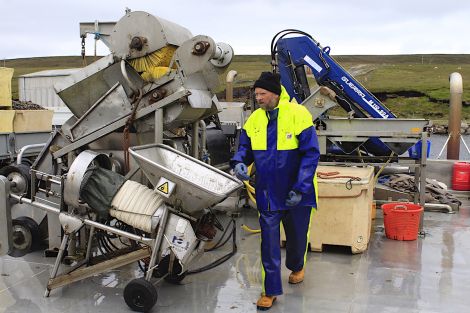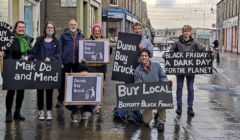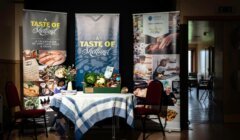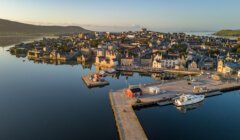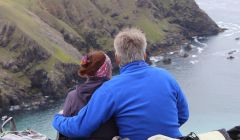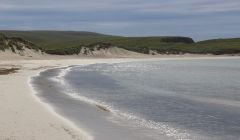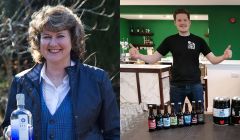Coronavirus / How are we going to live sustainably as an island community after Covid-19?
As part of our Covid-19 coverage we are asking our readers to contribute short personal, reflective pieces that touch on the many aspects of living through these unprecedented times. Here are Alex Purbrick’s thoughts.
THE ARRIVAL of the Covid-19 virus has transformed overnight the ways in which we conduct our daily lives.
As the virus continues to overwhelm many countries throughout the world, we, in the prosperous Western hemisphere have been forced to confront the reality of how we live. As little as two months ago our lives seemed to be on a fast track of consumerism, climate change denial and constant striving to produce an excess of material wealth far beyond our needs.
A virus has forced us to stop or at least slow down and reflect on how we live and where we think we are going as a species.
In Shetland, the majority of products we consume, whether it is food, hardware, toiletries, clothing is produced elsewhere in the global supermarket. Shetlanders are no longer self-sufficient and Covid-19 has fiercely reminded us of this interconnection with the rest of the world.
We are a global community, one human family, completely dependent on each other, and our environment.
We are fortunate in Shetland to have strong strands of community, networks of support and care for those who are vulnerable and in poor health. But there are many people who have lost their job during this time or whose business has become a redundant or obsolete service in this period of lockdown.
With cafes and restaurants currently closed, Shetland’s seafood industry has certainly been affected as demands for fresh seafood in the realms of fine dining has plummeted.
For a small business, like C & A Thomason in Yell, operated by brothers, Marvin and Christopher, who harvest and supply mussels to retail and wholesale markets across the UK and abroad, the Covid-19 lockdown could potentially be a disaster.
Although they usually finish harvesting mussels in May, the company have temporarily closed for the lockdown period and have given temporary furlough leave to their five full-time employees and four seasonal staff.
Become a member of Shetland News
This time of year is traditionally when seed mussels are transferred from their sites in Yell at the voes of Whalfirth to Basta, but for now all Marvin can do is routinely check the mussel lines and take daily samples of the mussels to be tested for toxins.
Yet Marvin remains optimistic about his situation. “We are lucky to have a croft, so every day we are mucking oot sheds and feeding the stock. The coos are still inside as are the gimmer lambs.
“Our lambing starts shortly so we will be keeping very busy with that. We are fortunate to live in Yell with good shops for all our needs and we’re able to walk to a beach or hill within a few yards of the house without seeing anyone.”
The future may not be so bleak for Marvin and Christopher. Mussels are a self-sustaining food product, which are happily growing on lines in the sea with minimal human intervention until harvesting resumes in the autumn, which will hopefully give the company time to resume business.
Small, local food producing businesses like the Thomasons may be an important source of food for Shetland when we emerge from our isolation bubble to find a world scarred from a pandemic which has taken its toll on our global food producers and opened our eyes to the realisation that excessive food consumption may no longer be an option.
We may be forced to confront how we are going to live sustainably as an island community and what form that will assume. Do we continue business as usual, plundering the earth’s resources to extinction?
Or do we face up to the red flags that this virus has brought to our attention, that to live sustainably means to look for solutions within our own community instead of deferring to global corporations whose interests are profit driven and not interested in the wellbeing of the individual.
There are no easy fix answers to any of these questions but whilst we are in this period of isolation maybe this could be the time to support our local businesses and to examine the ways in which we as an island can nurture those in our community who are working with the land and sea to ensure that we continue to be fed.
Please feel free to get in touch and share your thoughts and experiences of what challenges life throws at you right now.
How do you cope with self-isolation, being unable to go to work or see friends, with home education, with loneliness? And what do you do to counter it? Start an Open University course, go through all those family photos or spend more time with friends online?
We look forward to hearing from you at news@shetnews.co.uk
Become a member of Shetland News
Shetland News is asking its readers to consider paying for membership to get additional perks:
- Removal of third-party ads;
- Bookmark posts to read later;
- Exclusive curated weekly newsletter;
- Hide membership messages;
- Comments open for discussion.
If you appreciate what we do and feel strongly about impartial local journalism, then please become a member of Shetland News by either making a single payment, or setting up a monthly, quarterly or yearly subscription.






